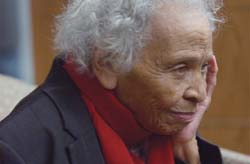

AfterWords
Race and Remembrance
A survivor of the nation’s worst race riot remembers a devastating lesson. By Scott Hauser
 |
| TESTAMENT: A survivor of the Tulsa race riot of 1921, Hooker ’62 (PhD) testified on Capitol Hill last spring. |
Olivia Hooker ’62 (PhD) was 6 years old when she received a searing lesson about her fellow Americans.
On an otherwise shimmering late spring day, the first-grader was surprised to hear thudding noises outside her house in what was known as the Greenwood section of Tulsa, Oklahoma.
“I said, ‘How can it be hailing when the sun is shining brightly?’” the 90-year-old retired Fordham University psychology professor recalls.
Her mother, Hooker says, carefully led her to a window and pointed: “That is a machine gun up there on that hill, and there’s an American flag on it. That means your country is shooting at you.”
Hooker, one of five children of a prominent department store owner and a former teacher, had found herself an unwitting target in the Tulsa race riot of 1921, one of the nation’s worst—yet rarely acknowledged—episodes of racial conflict in American history.
On May 31 of that year, an estimated 10,000 white men descended on Tulsa’s courthouse to demand that a black man who had been accused of assaulting a white woman be turned over to them. A group of about 80 African Americans, many of them World War I veterans and some of them armed, turned out to defend the accused man.
When one of the mob tried to disarm one of the defenders, a shot rang out and the riot was under way. Police deputized white citizens and the state’s National Guard was called in to detain black men. A week later, as many as 300 black people were missing and presumed buried in mass graves, and the prosperous Greenwood section, known at one point as the “black Wall Street” of the Midwest had been obliterated, including the department store owned by Hooker’s father.
“Nothing was left but rubble,” says Hooker, who is one of about 400 people—survivors and descendants of former Greenwood residents—who have been trying to get restitution for the damages caused by the marauding white Tulsans.
Last spring, she testified on Capitol Hill in hearings organized by the Congressional Black Caucus after the Supreme Court declined to hear an appeal from the group. A lower court had dismissed the case for restitution, arguing that the statute of limitations prohibited bringing such claims after a few years.
Hooker, who was a special guest at the College’s Meliora Weekend last fall, doesn’t hold out much hope that the claims will ever be acknowledged by the nation’s courts. Her father tried for seven years to receive damages from his store’s insurance policies but never received anything.
But she says she tries to keep her bitterness in check and remembers the examples of her parents who, as exemplars of prairie stoicism, continued to fight for better lives for their children.
The family eventually settled in Columbus, Ohio, where her father built a new career in real estate. All five of the children went to college, with Hooker earning a degree from Ohio State.
During World War II, she enlisted in the Coast Guard, becoming the first African-American woman in that branch of the service.
Using her GI Bill benefits, she earned a master’s degree from Columbia and in 1948 was completing an internship at the former Albion (New York) State Training School, a prison for women with developmental disabilities, when she began taking classes at Rochester.
She later was admitted to the Ph.D. program in psychology, where she worked with the late Emory Cowen. “I wasn’t a typical student,” she says, noting that among the 13 graduate students who started with her, she was older than her classmates and was the only woman—and African American—in the group.
For her dissertation, she studied the learning abilities of children with Down syndrome, the beginning of a long career focused on children with developmental disabilities. She taught and continued her research at Fordham until she retired in 1985.
But even after 84 years, the lessons of that June day have not faded.
“I was devastated,” Hooker says. “I believed in America and the ‘land of the free and the home of the brave.’”
She’s made the appreciation of tolerance—whether that means children with disabilities or people from different races—part of her educational mission.
“I feel that you do what you can to help the world, and you don’t mourn for what’s gone.”
